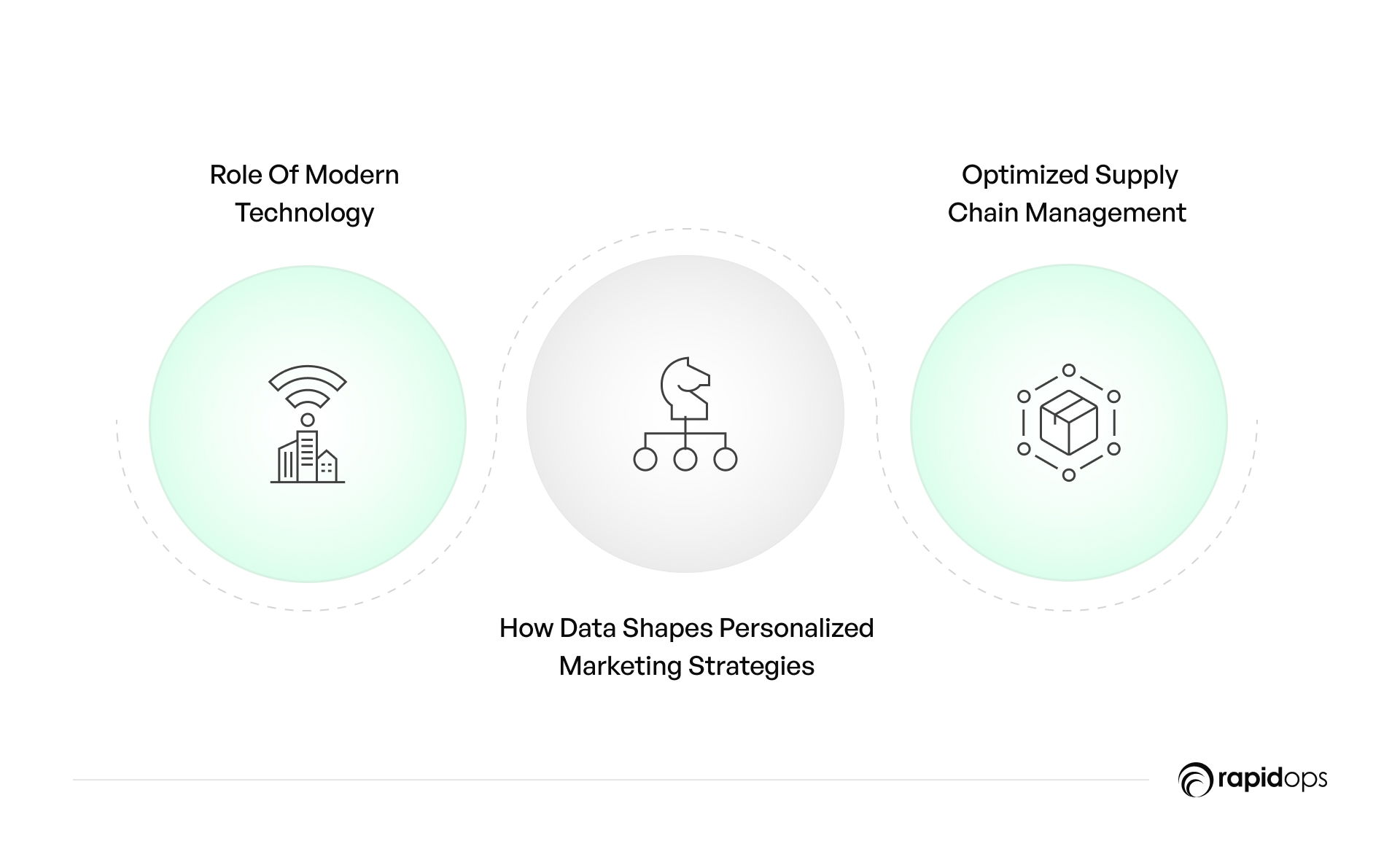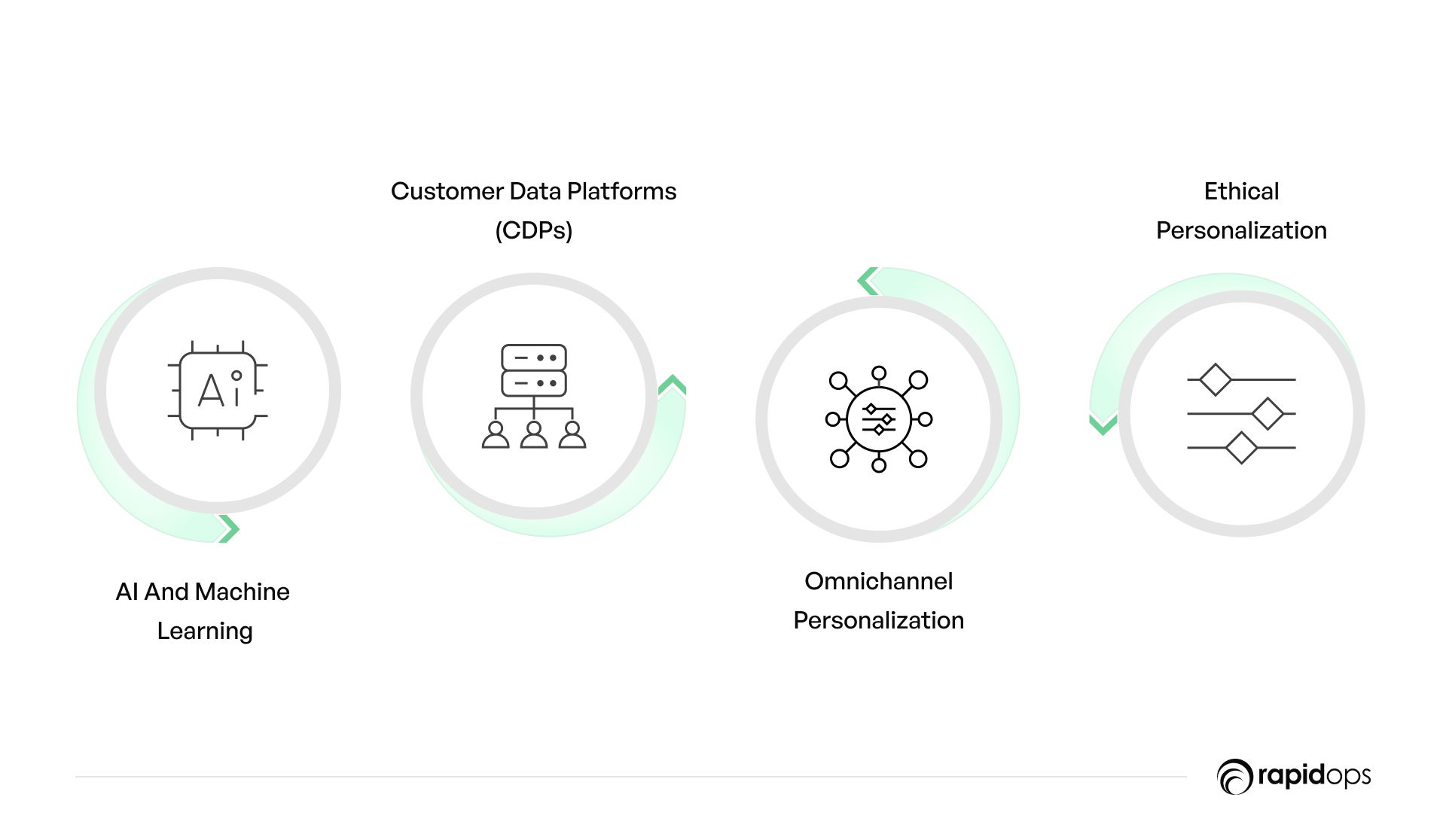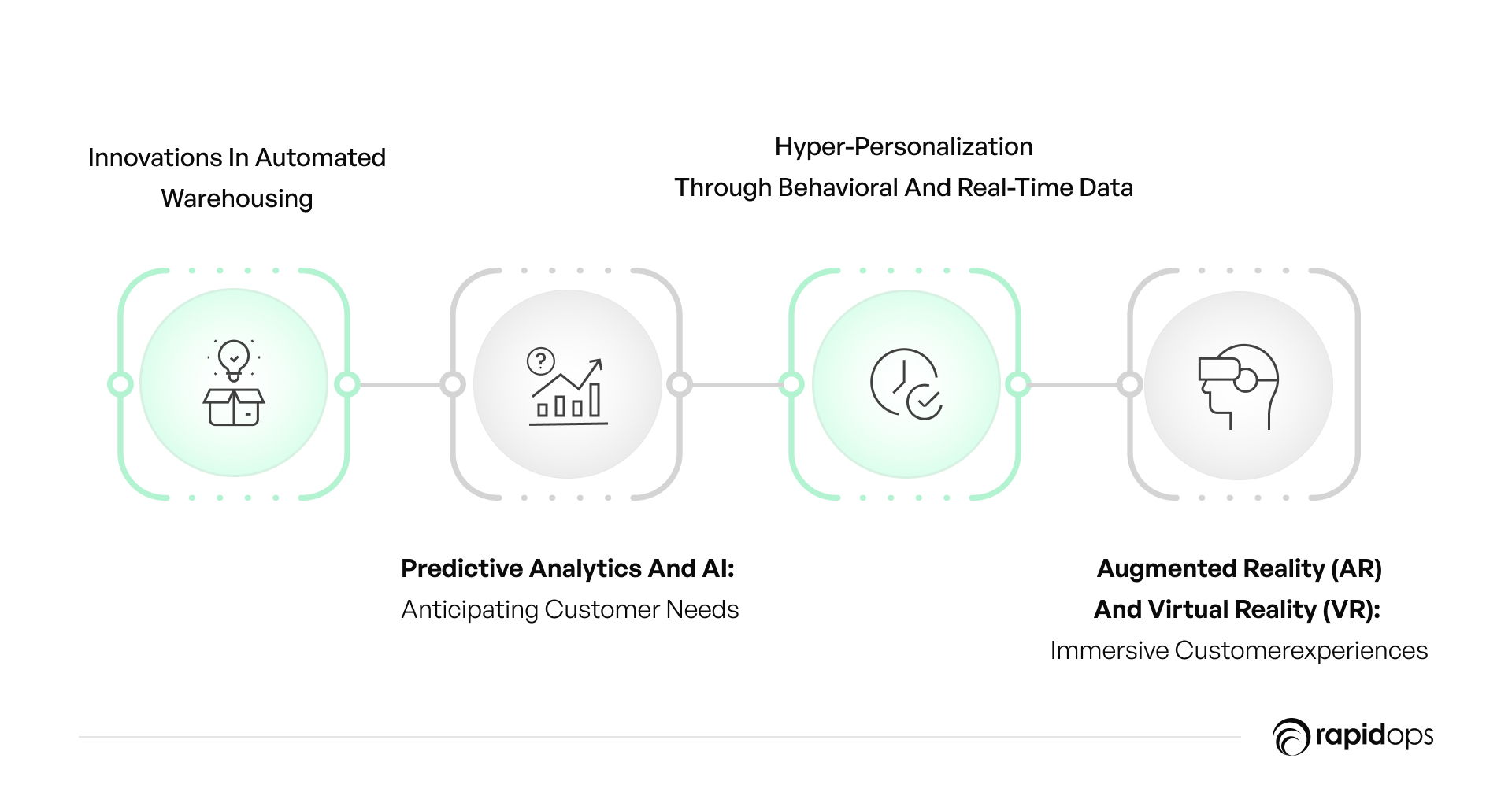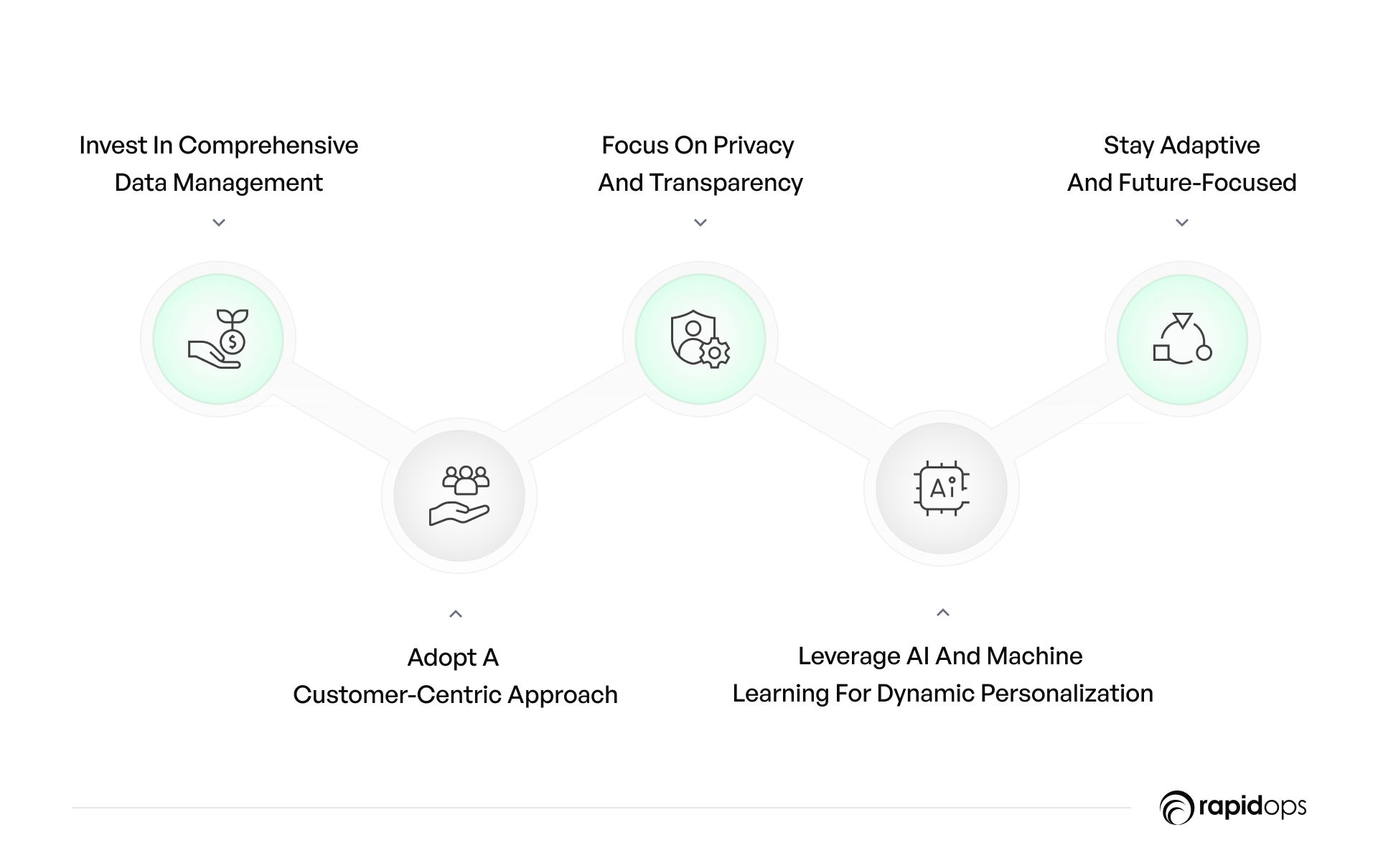- Strategy
- 12 min read
- October 2024
The Future of Personalization
Key Takaeaways
Personalization has become more than a trend; it’s a powerful business strategy that’s reshaping how brands connect with customers. With each interaction, customers now expect brands to deliver experiences that feel tailored, relevant, and, most importantly, personal.
In fact, businesses that prioritize personalization often see stronger customer loyalty and higher engagement, setting them apart in today’s competitive landscape.
But what does the “future of personalization” hold? With rapid advances in technology, personalization is shifting from simply using basic customer data to providing proactive, data-driven experiences that anticipate and address individual customer needs—even before they’re expressed.
This article will guide you through the current landscape of personalization, highlight the exciting trends shaping its future, and provide actionable insights on preparing your business to thrive in this new era of customer engagement.
The state of personalization: Where are we now?

In discussing the “future of personalization,” it’s essential to understand where personalization stands today and how it has evolved to meet changing customer expectations.
Personalization has quickly evolved from a simple “Hello, [First Name]” email salutation to a sophisticated, data-driven approach that enhances every touchpoint of the customer journey.
In today’s competitive market, businesses are leveraging vast amounts of customer data to create experiences that feel uniquely crafted for each individual.
The role of modern technology in personalization
Current personalization strategies are largely powered by advancements in personalization technology and AI in personalization. With artificial intelligence and machine learning, brands can analyze customer behavior and their preferences and even predict future actions.
This approach allows for customer experience personalization at scale, offering relevant products, services, or content at the right moment.
How data shapes personalized marketing strategies
Data-driven personalization has become central to modern marketing strategies. Businesses utilize customer data platforms (CDPs) to consolidate insights from different channels, enabling them to deliver consistent, relevant experiences.
Personalized marketing strategies now consider not only past customer purchases but also browsing habits, demographic data, and engagement history, creating a more cohesive and targeted customer experience.
Achieving personalization with AI-driven solutions
Artificial intelligence and machine learning tools play an integral role in the rise of predictive personalization. By harnessing these technologies, companies can anticipate needs, streamline the personalized customer journey, and offer suggestions that feel genuinely intuitive.
This means that personalization today is not just about reacting to customer behavior but proactively crafting experiences that resonate with them on a deeper level.
Trends shaping the future of personalization in business

The “future of personalization” is being defined by rapid technological advancements and changing consumer expectations, pushing businesses to innovate continuously.
As the demand for hyper-relevant experiences grows, businesses are shifting toward more dynamic and predictive personalization. Let’s look at the trends poised to shape the future of personalization, helping companies offer next-level engagement.
AI and Machine Learning: The backbone of predictive personalization
AI and machine learning are at the heart of the personalization technology driving predictive personalization. With these tools, companies can go beyond basic personalization, leveraging algorithms that predict individual needs and preferences.
This shift allows businesses to deliver more sophisticated, in-the-moment experiences that anticipate customer desires before they even voice them.
Customer data platforms (CDPs): Enabling real-time personalization
Data is central to personalization, and customer data platforms (CDPs) play a crucial role by consolidating data from various sources to create a comprehensive view of each customer.
With CDPs, brands can deliver hyper-personalization in real-time, adapting offers and content across channels to meet customers’ immediate needs. This interconnected approach provides a seamless experience that feels fluid and personal.
Omnichannel personalization: Consistency across every touchpoint
Customers now expect personalized experiences not only online but across every interaction, from physical stores to social media.
Omnichannel personalization integrates data from these diverse touchpoints, allowing brands to create a unified experience that remains consistent, regardless of where the customer interacts with the brand.
This trend emphasizes the importance of connecting online and offline data to deliver meaningful, cross-channel engagement.
Ethical personalization: A balance between personalization and privacy
With consumers becoming increasingly aware of data privacy, ethical personalization is emerging as a critical trend. Businesses are rethinking how they collect and use data to build trust with their audience.
This trend involves ensuring transparency and offering customers control over their data, creating a personalization model that respects privacy while still delivering relevant experiences.
Such shift toward ethical personalization reflects an understanding that long-term relationships require transparency and accountability.
These trends are setting the stage for a more sophisticated future, where personalization will not only meet but anticipate customer expectations in ways that feel seamless, meaningful, and respectful of their privacy.
Envisioning the future of personalization: What’s next?

The future of personalization is set to transform the business landscape, pushing boundaries with innovation, hyper-personalization, and intelligent predictions.
As personalization technology evolves, the next decade promises groundbreaking advancements that will redefine customer engagement and experience. Here are the major areas set to impact personalization’s future:
Hyper-personalization through behavioral and real-time data
In the future, brands will move from general personalization to hyper-personalization, where every interaction is tailored based on real-time behavior and preferences.
By analyzing behavioral data, brands can respond instantly to customer actions, offering the right message or product at the perfect moment.
This improves relevance and fosters a stronger emotional connection, making every interaction feel unique.
Predictive analytics and AI: Anticipating customer needs
With AI in personalization and predictive analytics, the future will see personalization evolve from reactive to proactive. AI-driven insights allow businesses to anticipate what customers need before they know it themselves, creating a level of personalization that feels almost intuitive.
For example, AI could analyze customer patterns to predict future purchases or identify potential issues, enabling businesses to offer proactive solutions and recommendations that feel personalized and insightful.
Augmented Reality (AR) and Virtual Reality (VR): Immersive customer experiences
AR and VR are poised to play significant roles in the future of customer engagement, offering immersive, highly personalized experiences.
Imagine a retail environment where customers can “try on” clothes virtually or a home decor platform where users can see how furniture looks in their space—all tailored to their specific tastes and preferences.
This next generation of personalized customer journeys can enhance customer satisfaction by making experiences more interactive and visually compelling.
Sustainability and ethical personalization: A new kind of engagement
Sustainability is becoming a key factor in consumer decision-making, and personalization can support this shift. Brands can guide customers toward eco-friendly choices by curating personalized recommendations based on sustainable criteria, like carbon footprint or ethical sourcing.
This approach combines the future of personalization with a commitment to responsible business practices, building stronger relationships with customers who prioritize ethical consumption.
The role of AI-driven insights in shaping personalization
With AI-driven customer insights, personalization strategies will become increasingly sophisticated. By integrating machine learning personalization models, businesses can continuously learn from each interaction and fine-tune their approach.
This evolution empowers brands to deliver an experience that not only meets customer expectations but continually evolves to keep pace with changing behaviors and preferences.
The future of personalization holds immense promise, combining technological advancements with a focus on ethical and sustainable practices. As businesses prepare for this transformation, they have the potential to offer experiences that are more relevant, meaningful, and valuable than ever before.
Preparing your business for the future of personalization

As businesses look to leverage the future of personalization, adopting best practices will be crucial to staying competitive and effectively engaging customers.
To thrive in the evolving landscape of personalization, businesses must be proactive in refining their strategies and adapting to new technologies. Here are some of the best practices that will help businesses create successful, sustainable, and future-ready personalization approaches:
Invest in comprehensive data management
Data is the foundation of effective personalization. With a solid data management strategy, businesses can ensure they’re working with accurate, up-to-date, and meaningful information.
This includes consolidating data from all sources, such as website interactions, social media, and customer feedback, into a unified Customer Data Platform (CDP). With a well-organized data system, brands can more efficiently execute data-driven personalization and respond to customer needs with precision.
Adopt a customer-centric approach
At the heart of personalization lies the customer. Rather than focusing solely on increasing sales, businesses should prioritize relevance and value for each customer interaction.
This customer-first mindset ensures that the personalization effort is meaningful and enhances the overall customer journey. By making customer satisfaction the primary goal, businesses can create long-term loyalty and strengthen their brand’s reputation.
Focus on privacy and transparency
As personalization becomes more data-intensive, businesses face increased scrutiny regarding data privacy. Transparent data practices are essential to building customer trust.
By openly communicating how customer data is collected, stored, and used, businesses can ease privacy concerns and demonstrate a commitment to ethical personalization.
Furthermore, allowing customers to control their data fosters a positive relationship, making them more likely to engage with personalized content.
Leverage AI and Machine Learning for dynamic personalization
AI and machine learning will drive much of the future of personalization by enabling real-time, dynamic interactions.
By implementing AI-driven customer insights, businesses can move beyond static data and provide personalized experiences that adjust to each customer’s evolving preferences.
Machine learning models continuously refine their recommendations based on real-time behaviors, ensuring that the personalization remains relevant and engaging.
Stay adaptive and future-focused
The future of personalization will require agility and responsiveness to rapid changes in technology and customer expectations. Businesses should actively monitor personalization trends, emerging technologies, and shifts in consumer behavior to ensure they’re prepared to innovate as needed.
This proactive approach helps businesses maximize the potential of personalization tools and stay competitive in a constantly evolving market.
By adhering to these best practices, businesses can harness the full potential of personalization and deliver experiences that are not only customized but also ethical, transparent, and truly valuable.
As personalization becomes even more integral to customer engagement, these practices will help businesses foster stronger, lasting relationships with their customers.
Concluding thoughts
As we navigate the shifting landscape of consumer expectations, the future of personalization stands as a cornerstone for businesses seeking to foster deeper connections with their customers.
The journey from traditional marketing methods to sophisticated, data-driven personalization is well underway, and understanding this evolution is essential for brands that aim to thrive in the competitive marketplace.
Looking ahead, the integration of advanced technologies like AI, machine learning, and customer data platforms will revolutionize the way businesses engage with their audiences. The hyper-personalization of customer experiences will no longer be a luxury; it will be a necessity for survival.
In this future, brands that prioritize ethical personalization and transparent practices will stand out as leaders, earning the trust and loyalty of informed consumers who expect their interactions to be both relevant and respectful.
Imagine a world where every customer touchpoint—be it through e-commerce platforms, social media, or in-store experiences—delivers a seamless, tailored interaction that feels intuitive and personal.
Picture brands that anticipate needs before they arise, crafting unique journeys for each customer based on their preferences, behaviors, and even values. This is not just a vision; it’s a tangible future on the horizon, driven by the convergence of technology, data, and consumer insights.
As we embrace this future, businesses must remain adaptable and forward-thinking, continually refining their strategies to meet the dynamic demands of the marketplace.
The organizations that thrive will be those that invest not only in technology but also in the principles of empathy, trust, and transparency. Personalization has the potential to create profound connections between brands and their customers, shaping experiences that are not only individualized but also meaningful.
The future of personalization offers exciting possibilities, challenging us to rethink how we engage with our customers. By embracing innovation and staying true to ethical practices, businesses can not only enhance their competitive edge but also contribute to a future where every customer feels valued and understood.
The time to prepare is now! Let Rapidops be your trusted technology partner in handling all things technical and guide you through this lucrative future of personalization with the necessary roadmap.
Get in touch with our data and AI experts to fully understand implementing end-to-end personalization in your business.
Frequently Asked Questions
What is the role of behavioral data in enhancing personalization?
How is machine learning used in predictive personalization?
What are some examples of omnichannel personalization?
What are the risks of over-personalization?
How can small businesses leverage personalization without a large data infrastructure?
What is contextual personalization, and why is it important?
How do personalization strategies vary across different industries?
How does ethical personalization benefit brands long-term?
What role do Customer Data Platforms (CDPs) play in personalization for B2B companies?




